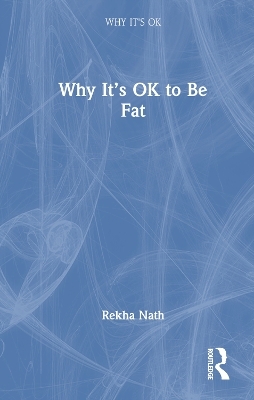
Why It’s OK to Be Fat
Seiten
2024
Routledge (Verlag)
978-0-367-42549-4 (ISBN)
Routledge (Verlag)
978-0-367-42549-4 (ISBN)
Most of us aren’t quite sure: Is it really OK to be fat? In Why It’s OK to Be Fat, Rekha Nath convincingly argues conventional views of fatness in Western societies—as a pathology to be fixed or as a moral failing—are ill-conceived.
Officially, Western societies are waging a war on obesity. Unofficially, we are waging a war on fat people. Anti-fat sentiment is pervasive, and fat people suffer a host of harms as a result: workforce discrimination, inferior medical care, relentless teasing, and internalized shame. A significant proportion of the population endures such harms. Yet, that is not typically regarded as a serious problem. Most of us aren’t quite sure: Is it really OK to be fat? This book argues that it is.
In Why It’s OK to Be Fat, Rekha Nath convincingly argues that conventional views of fatness in Western societies—as a pathology to be fixed or as a moral failing—are ill-conceived. Combining careful empirical investigation with rigorous moral argumentation, this book debunks popular narratives about weight, health, and lifestyle choices that underlie the dominant cultural aversion to fatness. It argues that we should view fatness through the lens of social equality, examining the wide-ranging ways that fat individuals fail to be treated as equals. According to Nath, it is high time that we recognize sizeism—the systematic ways that our society penalizes fat individuals for their size—as a serious structural injustice, akin to racism, sexism, and homophobia.
For additional online material from the author, related to this book, please see rekhanath.net
Officially, Western societies are waging a war on obesity. Unofficially, we are waging a war on fat people. Anti-fat sentiment is pervasive, and fat people suffer a host of harms as a result: workforce discrimination, inferior medical care, relentless teasing, and internalized shame. A significant proportion of the population endures such harms. Yet, that is not typically regarded as a serious problem. Most of us aren’t quite sure: Is it really OK to be fat? This book argues that it is.
In Why It’s OK to Be Fat, Rekha Nath convincingly argues that conventional views of fatness in Western societies—as a pathology to be fixed or as a moral failing—are ill-conceived. Combining careful empirical investigation with rigorous moral argumentation, this book debunks popular narratives about weight, health, and lifestyle choices that underlie the dominant cultural aversion to fatness. It argues that we should view fatness through the lens of social equality, examining the wide-ranging ways that fat individuals fail to be treated as equals. According to Nath, it is high time that we recognize sizeism—the systematic ways that our society penalizes fat individuals for their size—as a serious structural injustice, akin to racism, sexism, and homophobia.
For additional online material from the author, related to this book, please see rekhanath.net
Rekha Nath is Associate Professor of Philosophy at the University of Alabama, USA. She works in moral and political philosophy.
1. Introduction 2. Against Fat Stigma 3. Weight and Health 4. Is it Wrong to be Fat? 5. Weakness of Will 6. Ignorance, Gluttony, and Pride 7. Size-based Oppression 8. What does Fat Acceptance Entail? Notes Bibliography Index
| Erscheinungsdatum | 22.08.2024 |
|---|---|
| Reihe/Serie | Why It's OK |
| Verlagsort | London |
| Sprache | englisch |
| Maße | 129 x 198 mm |
| Gewicht | 362 g |
| Themenwelt | Sachbuch/Ratgeber ► Gesundheit / Leben / Psychologie |
| Medizin / Pharmazie ► Medizinische Fachgebiete ► Psychiatrie / Psychotherapie | |
| Studium ► Querschnittsbereiche ► Prävention / Gesundheitsförderung | |
| Sozialwissenschaften ► Kommunikation / Medien ► Medienwissenschaft | |
| ISBN-10 | 0-367-42549-1 / 0367425491 |
| ISBN-13 | 978-0-367-42549-4 / 9780367425494 |
| Zustand | Neuware |
| Haben Sie eine Frage zum Produkt? |
Mehr entdecken
aus dem Bereich
aus dem Bereich
das Manual zur psychologischen Gesundheitsförderung
Buch | Hardcover (2023)
Springer Berlin (Verlag)
39,99 €
Orthomolekulare Medizin in Prävention, Diagnostik und Therapie
Buch | Hardcover (2022)
Thieme (Verlag)
71,00 €


